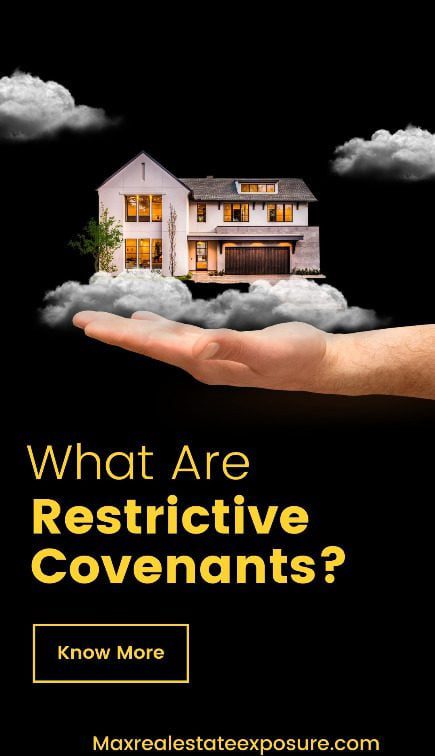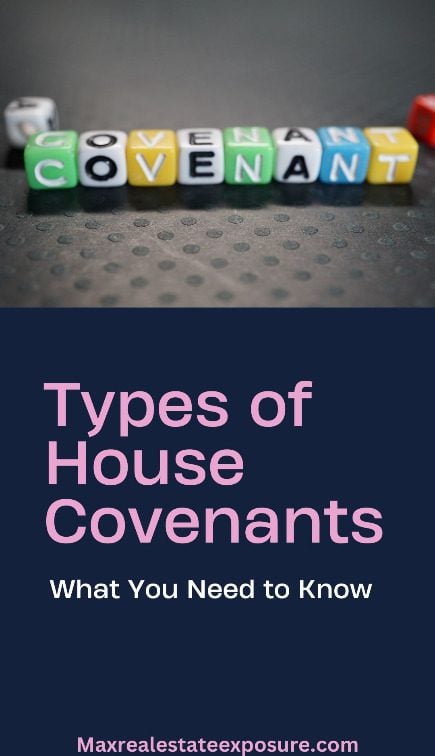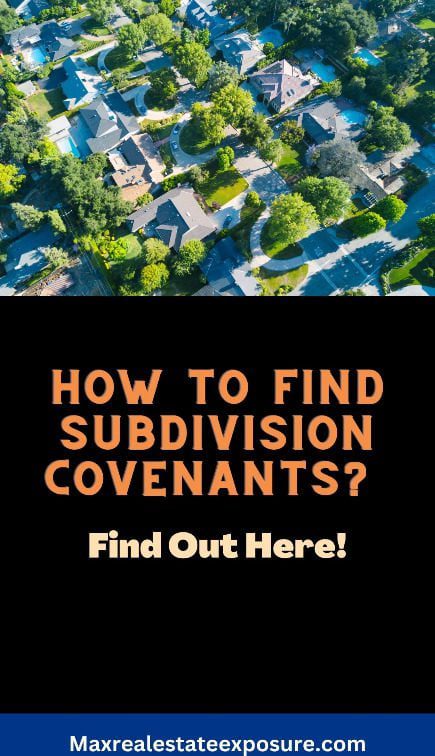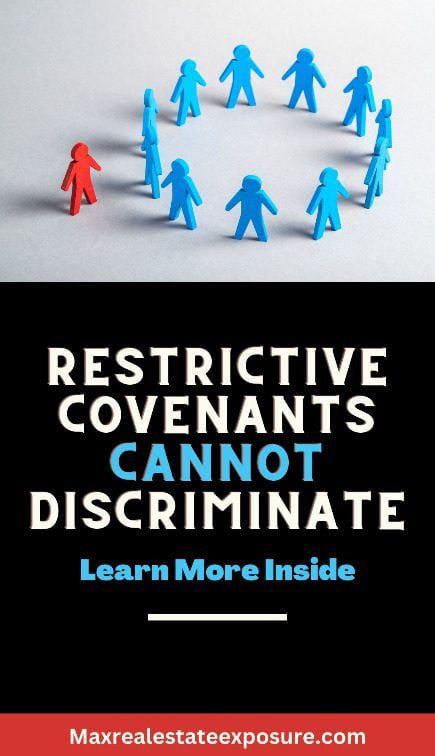The Ultimate Guide to Covenants, Conditions, and Restrictions (CC&Rs)
 Have you heard of restrictive covenants or house covenants?
Have you heard of restrictive covenants or house covenants?
While you might have a checklist of things you want from your next home, you might also need to consider what you are and aren’t allowed to do when you own it.
If you buy a home within an HOA or another type of planned community, you may be restricted in how you use your property.
Some people in the real estate industry call them restrictive covenants, while others call them protective covenants. Depending on which side of the fence you sit on, you might consider property covenants positively or negatively.
Though you might find your perfect home, there could be house covenants that you need to consider. These restrictive covenants might not make your prospective home look as good as it initially did.
On the other hand, you may love the fact there are house covenants. But what is a house covenant, and what does living in this type of community mean?
We will examine everything you need to know about property covenants. Restrictive covenants in real estate are commonplace, so you’ll likely encounter them.
Before making an offer on a house, you should research any covenants.
What Are Covenants?
Real estate agents often explain the meaning of the housing covenant to their clients.
In real estate law, land-related covenants can be called real covenants, conditions, and restrictions (CCRs) or deed restrictions. They usually impose restrictions on how the land can be used (negative covenants) or require a specific continuing action (affirmative covenant).
Property covenants may also “run with the land” (a covenant appurtenant), meaning that future landowners must abide by the terms.
Covenants, conditions, and restrictions, or CC&Rs, control what property owners can do within a community. The original developer usually creates house covenants for the community.
A restrictive covenant can create a legally binding deed that limits what can and can’t be done with any homes in a community.
These title deeds can be considered protective covenants that ensure the community does not deteriorate by allowing homeowners to do anything with their properties.
Any homeowner who does not stick to the rules laid out in the deed can be given penalties by the homeowners association.
Having rules like this can seem overly restrictive, but the overall intention is to ensure standards are maintained in the area and protect property values.
Historical Context of Restrictive Covenants
The origins of restrictive covenants in the United States are deeply intertwined with the nation’s history of racial segregation and discrimination.
Following the Great Migration, where millions of African Americans moved from the rural Southern United States to urban areas across the country, restrictive covenants became a standard tool for maintaining racial segregation in housing.
These covenants were legally binding agreements written into property deeds that prohibited certain groups’ sale, lease, or occupation of a property, most notably Black Americans.
The infamous 1926 Supreme Court decision in Corrigan v. Buckley upheld the use of these covenants, further entrenching them into the fabric of American real estate practices.
It wasn’t until the landmark 1948 case of Shelley v. Kramer that the Supreme Court ruled the enforcement of racially restrictive covenants unconstitutional. It was a pivotal moment in the fight against housing discrimination.
In some respects, the legacy of the restrictive covenants has left a negative mark on some communities. It underscores the importance of understanding their history and ongoing relevance.
Legal and Regulatory Framework
The legal landscape surrounding restrictive covenants has evolved significantly over the years, shaped by landmark court decisions and legislative actions.
While the Supreme Court’s ruling in Shelley v. Kramer marked the beginning of the end for racially restrictive covenants, the Fair Housing Act of 1968 further solidified the legal standing against discrimination in housing.
Today, restrictive covenants are still enforceable, provided they do not infringe upon civil liberties or violate federal, state, or local laws, including those of discrimination.
Courts may refuse to enforce a restrictive covenant if it lacks standing or would not substantially benefit the community or the individuals seeking enforcement.
Understanding the current legal and regulatory framework is crucial for homeowners and real estate agents. It informs the enforceability and limitations of restrictive covenants in today’s real estate market.
What is a Negative Covenant?
When you are prohibited from doing something, it is known as a negative covenant. You will see specific examples of negative covenants as you continue reading.
What is a Positive Covenant?
On the other hand, a positive covenant is a promise to do something specific. For example, you may be required to maintain a shared driveway or fence.
Different Restrictive House Covenants
 Not all restrictive covenants are the same, with different types used in various communities. Let’s look at some of the most commonly used. These are the types of covenants you’re likely to see.
Not all restrictive covenants are the same, with different types used in various communities. Let’s look at some of the most commonly used. These are the types of covenants you’re likely to see.
Land and Property Use Restrictions
These covenants have rules over how the homeowner can use their land. This might mean rules about fencing, what outbuildings are allowed, and the type of animals that can live on the land. They are often referred to as the use of land restrictions.
The burden of a restrictive covenant is passed to new owners. Property owners must follow the recorded guidelines.
Property Alteration Restrictions
This house covenant covers what you can do with the home’s exterior. There could be restrictions on the property’s color or how you can alter the features.
Tenant Restrictions
This property covenant will limit the number of people living in the home. However, these covenants usually focus more on non-family members living in the house.
Maintenance Requirements
This covenant forces homeowners to maintain their homes regularly. This means keeping the lawns and staying on top of repairs to the exterior of the building, ensuring the aesthetics of the area are preserved.
Property Usage Requirements
These rules can restrict you if you consider using your home to operate your business. There could be restrictions about the type of business you are allowed to run from the property or a complete ban.
Pet Limitations
In some neighborhoods with a homeowners association, the number and type of pets allowed may be limited.
For example, it is not uncommon for associations to restrict the breed of dog you can have. Pit bulls and rottweilers are often prohibited due to their aggressive nature.
Examples of House Covenants You Might Face
There are many different covenants that a homeowners association might use to restrict what the community can do.
Commonly used restrictions include:
- No commercial vehicles: it is not uncommon to see covenants for parking commercial vehicles overnight at your home. Many communities do not want to see work trucks scattered throughout the development.
- No raising livestock: In many neighborhoods, raising livestock is not permitted.
- Homes have to be a minimum size: developers will often put a specific minimum square footage restriction on new builds in the neighborhood. The calculation of square footage will be taken from blueprints.
- Architectural guidelines: Many restrictive covenant agreements require specific architectural guidelines. For example, you may not be able to build certain styles of homes.
- Fences: If you want to fence your property, some covenants will not allow you to do this.
- Signage restrictions: You may not be able to post for sale signs or political interests.
- Colors: If you want to paint your house an unusual color, it might not be possible when you live in a planned community. This also stops your neighbor from choosing to paint their home in a color that isn’t in keeping with the rest of the neighborhood.
- Landscaping: Some covenants are created to prevent homeowners’ landscaping designs from becoming too outrageous.
- Home businesses: If you want to run a business from your property, there could be some restrictions to prevent you. Even if they allow businesses to be operated from homes in the community, the type of business might also be restricted. You can also face problems with zoning as you will still need to follow the city ordinances.
- Limiting occupants: Covenants can also restrict the number of people living on your property. This could be more of an issue if the home is your primary residence.
These are the most common restrictive covenants found in many neighborhoods. You’ll be able to find them in a restrictive covenants agreement.
When there is an HOA, these are other common rules.
How to Find Subdivision Covenants
 When you are interested in purchasing into a specific subdivision or neighborhood, it will be essential to know the covenants.
When you are interested in purchasing into a specific subdivision or neighborhood, it will be essential to know the covenants.
There are a few ways to find out a subdivision’s covenants. The first is asking your real estate agent if they have a copy of them.
If the agent has sold a home in the neighborhood before, they may have a copy. If not, you can ask a real estate attorney. A lawyer for real estate will be able to do a title search and see any restrictive covenants recorded in the deed.
A title company can also help you do this when you’re not in a state where attorneys are commonly used in real estate transactions. Deed restrictions are public record, so a potential home buyer could also get a copy at the local registry of deeds.
If the property’s original developer is still around, they will likely have a copy.
Challenges and Enforcement of Restrictive Covenants
Enforcing restrictive covenants can present many challenges for homeowners associations (HOAs) and individual property owners. The process often involves navigating complex legal terrain, especially when the covenants are outdated or in conflict with current laws.
For instance, while HOAs may have mechanisms for enforcing covenants, such as imposing fines or taking legal action, these measures can sometimes lead to disputes requiring judicial intervention.
Additionally, enforcing restrictive covenants must always be consistent and non-discriminatory, in line with the Fair Housing Act. This act prohibits discrimination based on race, color, religion, sex, disability, familial status, or national origin, rendering any covenant that violates these protections unenforceable.
The challenges associated with enforcing restrictive covenants underscore the importance of regular reviews and updates to ensure they remain relevant, legal, and in the community’s best interest.
What Can Happen When Enforcing Restrictive House Covenants
If you do not follow your community’s covenants, there will be problems. The HOA could apply various penalties to enforce their covenants.
When somebody in the community does not follow the rules, the CC&R documents can be referred to decide the penalty. Typical penalties could include the following:
- Warnings: The homeowners association might warn you if you breach the rules. This will give you a certain amount of time to fix the problem before other steps are taken.
- Fines: The HOA might fine you if you breach a covenant and a warning hasn’t worked.
- Lawsuit: If a homeowner continues to disregard the community covenants, there may be no other option than to start legal action against them.
- Liens: Another possible outcome is filing a lien against the property. Recorded liens happen when the homeowner owes money to the HOA through unpaid fines or fees. A lien on the property means that the homeowner cannot sell the home and receive the cash for it without dealing with this issue.
The Pros and Cons of Having Restrictive House Covenants in Your Community
While this restriction might have many negative aspects, it isn’t all bad.
Pros of House Covenants
- These covenants will ensure you don’t have to put up with a neighbor who fails to maintain their home correctly. A problem like this might reduce the value of your home when you come to sell.
- It can stop one of your neighbors from making extreme alterations to the exterior of their home.
- Most people want to live in a quiet neighborhood, and restrictions can prevent more significant numbers of people from living in one of the properties. With fewer people living in a home, there is less chance of things happening that could lead to disturbances and other issues. Dealing with a bad neighbor can be easier when a community enforces rules.
Cons of House Covenants
- You might find these restrictions too overbearing, holding you back from doing some of the things you want.
- If you want to change your home, you might first have to get approval from the HOA.
- You could be fined or suffer other ramifications if you unknowingly do something restricted under the covenant.
Deed Restrictions vs. HOA Rules
Keep in mind that restrictive covenants are a form of deed restriction. Deed restrictions, however, are different than HOA rules. HOA rules pertain to the property in a community, while deed restrictions are attached to the land.
Deed restrictions also differ because you’ll need court proceedings to change them. They may also expire after a specified period.
On the other hand, HOA agreements can be changed by a vote among community members. There could also likely be both HOA rules and restrictive covenants. It’s essential to know the distinction.
Examples of deed restrictions are the same as potential house covenants listed above.
The bottom line is that deed restrictions can only be changed or removed by going to court. A considerable number of residents would likely need to want changes made.
A judge could terminate a house covenant if they felt it was no longer applicable, illegal, discriminatory, or outdated. For example, racially restrictive covenants are unlawful and would be struck down.
You may wonder who enforces deed restrictions when there is no HOA. You would likely need to sue and go to court to enforce existing house covenants.
Restrictive Covenants Cannot Violate Fair Housing Laws
 As mentioned, covenants cannot include race restrictions or national origin. Racial covenants violate the Fair Housing Act and federal laws.
As mentioned, covenants cannot include race restrictions or national origin. Racial covenants violate the Fair Housing Act and federal laws.
Under the Fair Housing Act, you cannot discriminate based on the following:
- Basis of Race
- Color
- Religion
- National origin
- Sex, including sexual orientation and gender identity
- Disability
- Familial status
Racially restrictive covenants would be illegal. For example, saying only white people can live in a neighborhood or black families are not allowed.
Contact a property lawyer for legal advice if house covenants violate these guidelines.
A real estate business violating the Fair Housing Act would be in serious trouble.
The History of Restrictive Covenants
In the past, real estate developers would use restrictive covenants to control the demographics of many communities across the United States.
These restrictions kept certain populations out of specific neighborhoods, encouraging racial, ethnic, and cultural segregation.
For example, it was not unusual for real estate covenants to block black families from living in specific neighborhoods. In these racially discriminatory neighborhoods, you were only allowed to have white neighbors.
Black, Jewish, and Asian American families were made to look for homes in other locations by forming their segregated communities.
For example, the Goodwin company in Washington state had racially restrictive covenants in their property deeds that prohibited selling homes to anyone who was not of the “white race.”
The covenants went on to state further that no person not of the White race could be permitted to occupy any lot or building thereon except as a domestic servant employed by a white occupant of the property.
Racial Restrictions Ruled Unconstitutional
As I mentioned, The U.S. Supreme Court ruled in 1948 that racially charged provisions were unconstitutional under the country’s equal protection laws after hearing the case of Shelley v. Kraemer.
The ruling was handed down after Missouri’s highest court blocked the Shelleys, a black couple, from possessing the property they purchased in St. Louis in 1945.
The ruling came after Missouri’s top court blocked the Shelleys, a Black family, from taking possession of the home they bought in 1945 in St. Louis.
The Kraemers, a White family who lived nearby, filed a lawsuit against the Shelleys to prevent them from moving into the neighborhood. The lawsuit cited a restrictive covenant prohibiting people of color from occupying the property.
Despite the U.S. Supreme Court ruling, racial deed restrictions remain in effect in nearly every state in the U.S. While these covenants are no longer enforceable, the offensive language still exists.
These circumstances have led to calls for states to amend their laws to remove these outdated and discriminatory clauses.
What Are Unenforceable HOA Rules?
HOA rules become unenforceable when one or more of the following takes place:
- The rules violate ownership rights, or there is a breach of law
- Established incorrectly
- Enforcement is selective or inconsistent
- There is no power to act
Of course, you know the rules are what all community members must follow. Many people use the terms rules and covenants synonymously.
Homeowners association covenants will be located within an association’s covenants, conditions, and restrictions (CC&Rs).
Homeowner covenants are legally binding when they do not violate one of the problems.
The Impact of Restrictive Covenants on Communities
The impact of restrictive covenants on communities extends beyond the legal and regulatory aspects. They can influence neighborhoods’ social fabric and development patterns.
While initially used as tools for segregation, modern applications of restrictive covenants often aim to preserve a community’s aesthetic appeal and property values.
However, these covenants’ legacy of exclusion and discrimination cannot be overlooked. Studies have shown that restrictive covenants have contributed to long-term disparities in wealth accumulation, access to quality education, and overall community development.
Final Thoughts on Property Covenants
Covenants can be valuable in ensuring that the neighborhood continues to be a more desirable place to live. They are meant to maintain the value of the property. However, for some homeowners, these rules can feel too restrictive.
When considering moving to a property within a community with restrictive covenants, you must ensure you understand what you are letting yourself in for before you buy.
Before proceeding, you must study a community’s covenants, rules, and restrictions.
It would be best if you now had a much better understanding of a covenant’s meaning and how it applies in real estate.
About the Author: Bill Gassett, a nationally recognized leader in his field, provided the above real estate information on what restrictive covenants are. Bill has expertise in mortgages, financing, moving, home improvement, and general real estate.
Learn more about Bill Gassett and the publications in which he has been featured. Bill can be reached via email at billgassett@remaxexec.com or by phone at 508-625-0191. For the past 38+ years, Bill has helped people move in and out of Metrowest towns.
Are you thinking of selling your home? I am passionate about real estate and love sharing my marketing expertise!
I service Real Estate Sales in the following Metrowest MA towns: Ashland, Bellingham, Douglas, Framingham, Franklin, Grafton, Holliston, Hopkinton, Hopedale, Medway, Mendon, Milford, Millbury, Millville, Natick, Northborough, Northbridge, Shrewsbury, Southborough, Sutton, Wayland, Westborough, Whitinsville, Worcester, Upton, and Uxbridge Massachusetts.

